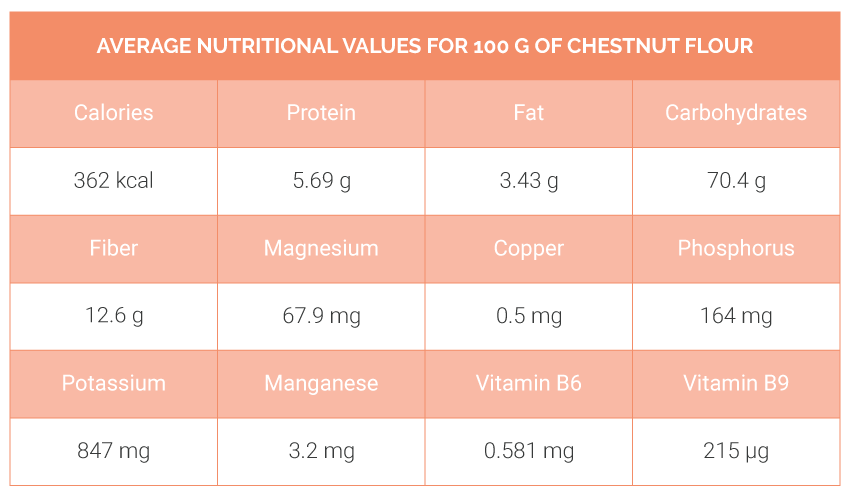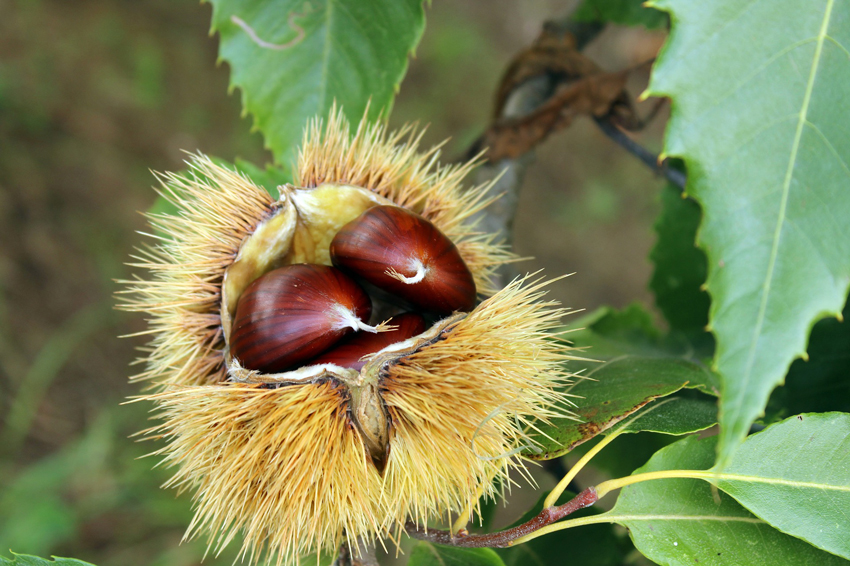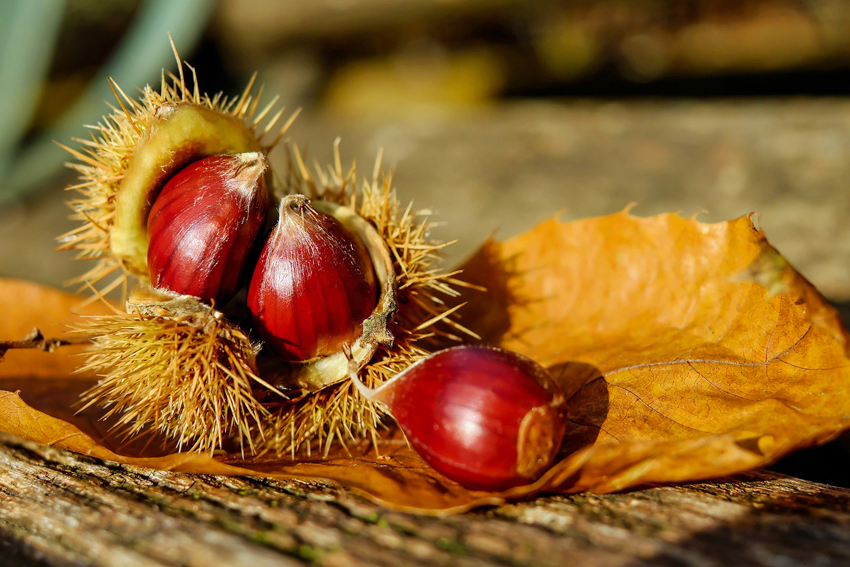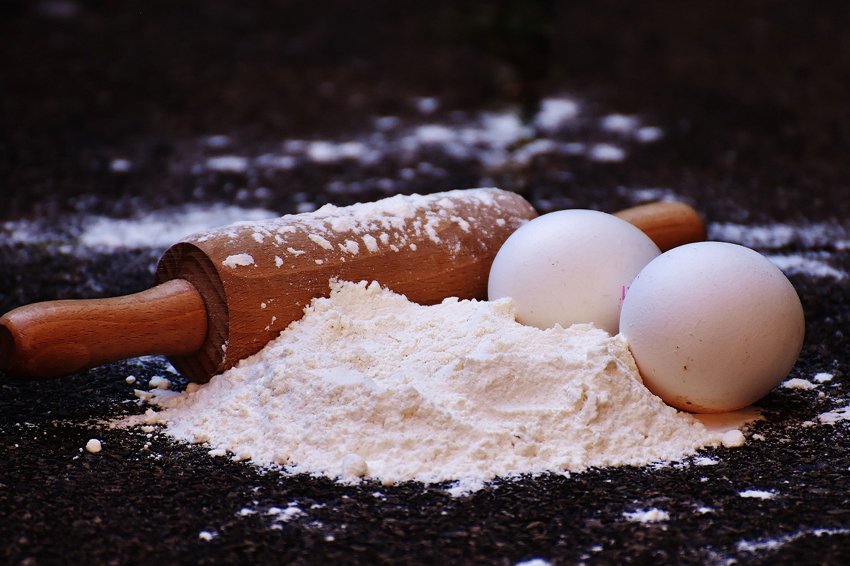Raw chestnuts, with their slightly sweet taste and crunchiness, are a universal food full of nutrients and health benefits. Chestnut flour is made by grinding up dried chestnuts. Chestnuts fall from the trees and are collected in early fall, then they’re left to dry and the husks are removed. The FizzUp trainer tells you more about why you should include chestnut flour in your everyday diet.
Chestnut flour is loaded with wholesome deliciousness. But first, let’s take a look at all the nutrients it contains… everything you need to do your body a whole lot of good.
Here are a few nutrition facts for 100 g of chestnut flour:

Chestnuts are nutrient dense both raw and ground into flour and their slow-digesting carbohydrates make them the perfect food to eat when you’re physically active.
In terms of your RDA* (recommended dietary allowances), chestnut flour covers nearly 50% of your daily intake of fiber, 20% of magnesium, 23% of phosphorus, 42% of potassium, 160% in manganese, 50% in copper, 108% in vitamin B9 (folic acid) and 42% in vitamin B6. It’s easy to see why chestnut flour is an extremely nutritious food that you should make part of your eating habits.
*Your recommended dietary allowances (RDA) is a set of recommendations for the amounts of vitamins and minerals the average adult should be eating for 100 g of food. This data is provided by the French Agency for Food, Environmental and Occupational Safety.
Chestnut flour is an excellent source of dietary fiber with about 12 g per 100 g. Dietary fiber is resistant to digestion. As it goes through the gastrointestinal tract, it helps food move through your intestines and satisfies your hunger because it’s incredibly filling. Fiber also relieves constipation, stabilizes your blood sugar and acts as nourishment for the good bacteria in your gut.

The carbohydrates in chestnut flour provide you with a steady flow of slow-burning energy that helps regulate your blood sugar. It’s high in resistant starch: a kind of prebiotic fiber that promotes probiotic bacteria growth. These bacteria keep your digestive system healthy and optimize nutrient absorption. Remember, how your body digests food is just as important as the nutritional benefits it contains.
Chestnuts are loaded with antioxidants: substances that neutralize free radicals. These are components that build up in your body over time and can cause cell damage and chronic diseases due to oxidative stress if they reach significantly high levels due everyday stress or repeated bouts of extreme exercise.
Antioxidants are associated with an impressive range of health benefits, from preventing cancer to fighting heart disease. The manganese and copper in chestnut flour fight free radicals and help rid your body of them.
Chestnuts contain calcium, phosphorus and magnesium. The first two are minerals your body needs for healthy teeth and bones because they’re the primary components in these body parts and need to be constantly replenished through your diet. Besides that, you need to have enough magnesium in order for these minerals to do their job correctly.

Magnesium also forms your tooth enamel and protects your bones against density loss that comes with age, lack of exercise and a poor nutrition.
As mentioned earlier, chestnuts are high in B-complex vitamins. You need them to keep your brain healthy, prevent nerve degeneration, keep your metabolism working correctly and have the energy you need on an everyday basis. Getting enough vitamin B leads to better brain function in the elderly and those suffering from Alzheimer’s. It’s also a must for any who’s physically active and wants to improve their health through nervous system recovery or relieve stress at home or work.
Chestnut flour is used for light and sweet recipes. This kind of flour is an extremely helpful way to boost your food’s nutritional value. One of the biggest perks about chestnut flour is that you can use it to overcome certain allergies so that you can still enjoy the baked goods you love.

Chestnut flour is gluten free and suitable for people who are gluten intolerant, suffer from celiac disease or want to reduce the amount of gluten in their diet. It’s also gentle on your digestive system. Although it doesn’t work for breadmaking because it’s gluten free, you can use this flour for cakes, crêpes, pancakes, mousse, muffins, cookies and pastries. It works deliciously well in soups and sauces you can serve with chicken, turkey or game, too. You can still use it to make bread or other baked goods with leavening dough, but it has to be sifted and mixed with bread flour. Because of its distinct flavor and density, it’s used in combination with more neutral flours, in proportions ranging from 30 to 50%.
Get even more nutritional guidance with FizzUp Nutrition*. Make the right choices in your eating habits and feel better about what’s on your plate. Over 150 tips, tricks and recipes are waiting for you in your app to put your diet to work for your fitness goal.
*FizzUp PRO feature
Join the 7 million users already registered on FizzUp
Join us